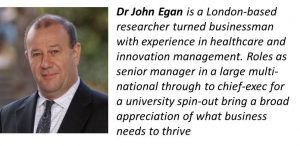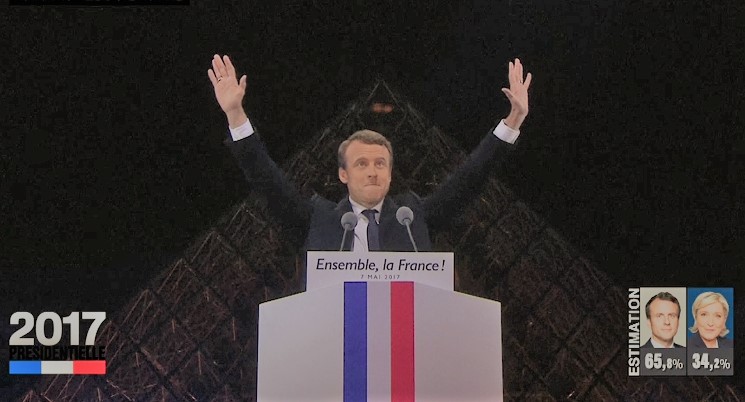The torch of the Lumières has been passed onto Emmanuel Macron. The signs are that it will be a heavy load to carry, writes John Egan from Paris.
Over the past nine months the presidential election in France has unfurled into an epic confrontation between ancient forces. It is a struggle that only shows signs of becoming more intense.
There has been a chorus of support for the En Marche! leader from many corners. Former United States president Barrack Obama issued a rare video endorsement and many EU leaders echoed its sentiment.
Tonight, as of 8.15pm, Macron had won 65.5 per cent of the vote.
On the face of it, Macron’s victory demonstrates that a positive vision about social liberal democracy, together with a pivotal future for Europe as the enabler of a more prosperous society for its citizens, can capture the large centre of national politics.
However, the definitive event was not so much tonight’s election of the president, which Macron was expected to win, but what occurred four days ago with the clash of the two candidates on national television. The face-to-face debate took place across a two metre table and, following the pattern of all previous campaigns, was expected to be a detailed dissection of the policies of the two aspirants for the Élysée Palace – Macron and Marine Le Pen.

Marine Le Pen and Emmanuel Macron in Wednesday’s debate
What actually took place was a nihilist assault by Le Pen – who stepped down two weeks ago as leader of the Front National (FN) – on Macron in which policy debate took second stage to personal defamation and insinuation, delivered with contempt and interspersed with sardonic laughter. Policy argument, particularly the feasibility of Le Pen’s economic policy to operate with two forms of currency in parallel, was abysmal but it did not appear to matter.
If the goal was to deliver a knock-out punch and see Macron crack live on television, then the strategy failed. In fact, Macron was robust in his response. “I am sitting face-to-face with the high priestess of fear,” he said. Instead, he outlined in detail his policies and left the viewer believing he could make them work.
Was there a bigger strategy behind Le Pen’s pre-election conflagration? It is a question that has since been much discussed in the cafes of France.
Had Le Pen accepted that she was not going to win and decided to use the opportunity to hoist her party into the role of official opposition in France, with her eyes on the next presidential campaign of 2022?
For over 50 years, the principle of “alternance” has operated in France, with the two main left-right parties switching presidential power like a pendulum – notwithstanding the events of 2002 when Le Pen’s father made it to the second round, before being crushingly defeated.
This time neither of the candidates represented the established parties and, indeed, any suggestion of proximity to the establishment has been toxic throughout both rounds of the presidential campaign. So, as the presidential winner uniquely has not followed the pattern of alternance, is it possible the official opposition might not either?
The scene for the next five years will be set in early June by the National Assembly elections. That is when the parliamentarians through whom Macron will need to work to enact his legislation will be elected. Whether alternance will be restored or the Front National becomes a new opposition will then be known.
If it is the latter, then Wednesday’s television debate gives a good idea of what might be in store. Parliamentary debate more akin to what one might imagine occurred in the Revolutionary Tribunals – with a dialogue of the deaf based on a deep-seated hatred of elites and their exercise of power over a population, many of whom they think do not act in their interest.
So, in winning the French presidential election from a standing start with his En Marche! party created less than a year ago, Emmanuel Macron’s achievement can only be described as spectacular.
He also has a portfolio of policies around which many from the centre of politics can rally round, although the reform of labour legislation which has caused such conflict with the unions in France remains controversial.
Two-hundred and fifty years ago in France the prevailing politics of mercantilism was hostile to the great advances made by the Lumières – the great assembly in Paris of intellectuals and polymaths whose ideas have since formed the fabric of modern societies around the world. Those experts were despised by the vested interests of economic nationalism who wished to retain a protected market through high import taxes on manufactured goods while seeking new markets for domestic product. Sound familiar?
In Emmanuel Macron there is great hope that the benefits of the Enlightenment can be maintained and lead to a sharing of prosperity.
At the same time there will be serious challenges to address: from climate change to terrorism. There will inevitably be storms to face, offering opportunities for an anti-establishment opposition in the ascendency to further make in-roads into the popular vote.
On Wednesday, Macron pointed out that responding to terrorism with oppression feeds into the agenda of the terrorist. It is a route to “civil war” he asserted. Yet, large slices of French society seem willing to follow Le Pen and sacrifice their freedoms for the security Le Pen seems to offer. Her incoherent economic policy threatens even the ability of their society to provide adequate healthcare and education.
It seems an unreasonable trade off, but fear has become the primary means in political dialogue to engage with the electorate. Macron is special in that he has chosen not to resort to this tried-and-tested contemporary formula.
He now needs to show his approach works and suppress the scepticism that has dogged his presidential predecessor François Hollande for years.
The next five years will be critical for the setting up of a society that reflects the economic optimism of Emmanuel Macron’s policies and vision. It will be important for many who live beyond the frontiers of France.
Follow on twitter: @johnmegan





